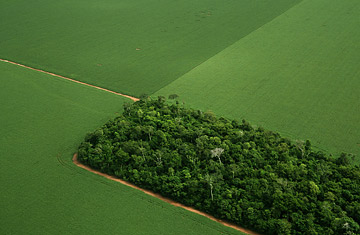
A tiny sliver of transitional rain forest is surrounded by hectares of soybean fields in the Mato Grosso state, Brazil.
(4 of 4)
Maggi got in trouble recently for saying he'd rather feed a child than save a tree, but he's come to recognize the importance of the forest. "Now I want to feed a child and save a tree," he says with a grin. But can he do all that and grow fuel for the world as well? "Ah, now you've hit the nail on the head." Maggi says the biofuel boom is making him richer, but it's also making it harder to feed children and save trees. "There are many mouths to feed, and nobody's invented a chip to create protein without growing crops," says his pal Homero Pereira, a congressman who is also the head of Mato Grosso's farm bureau. "If you don't want us to tear down the forest, you better pay us to leave it up!"
Everyone I interviewed in Brazil agreed: the market drives behavior, so without incentives to prevent deforestation, the Amazon is doomed. It's unfair to ask developing countries not to develop natural areas without compensation. Anyway, laws aren't enough. Carter tried confronting ranchers who didn't obey deforestation laws and nearly got killed; now his nonprofit is developing certification programs to reward eco-sensitive ranchers. "People see the forest as junk," he says. "If you want to save it, you better open your pocketbook. Plus, you might not get shot."
The trouble is that even if there were enough financial incentives to keep the Amazon intact, high commodity prices would encourage deforestation elsewhere. And government mandates to increase biofuel production are going to boost commodity prices, which will only attract more investment. Until someone invents that protein chip, it's going to mean the worst of everything: higher food prices, more deforestation and more emissions.
Advocates are always careful to point out that biofuels are only part of the solution to global warming, that the world also needs more energy-efficient lightbulbs and homes and factories and lifestyles. And the world does need all those things. But the world is still going to be fighting an uphill battle until it realizes that right now, biofuels aren't part of the solution at all. They're part of the problem.
